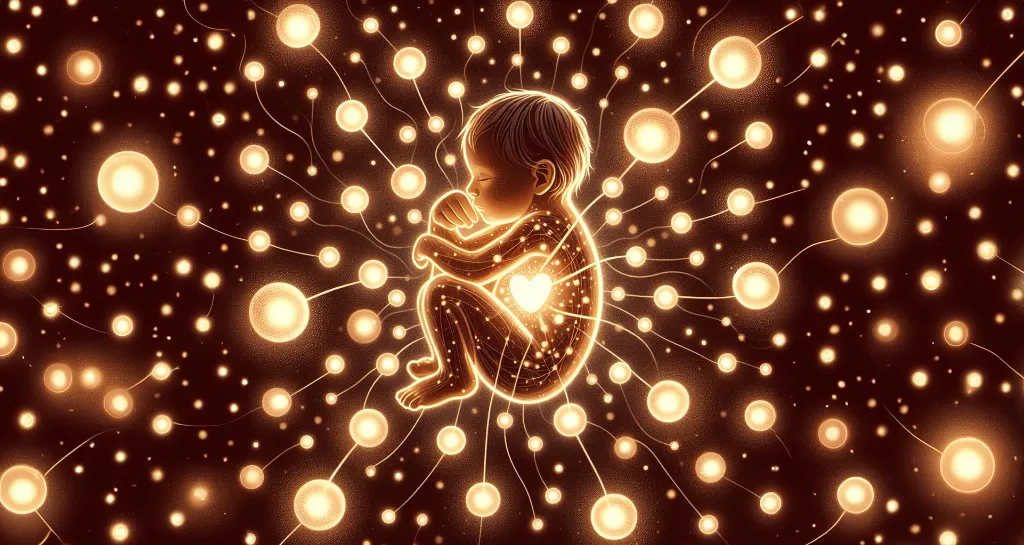Can fate be changed? Some believe that “fate is predetermined before birth,” while others argue that “what we do after birth can alter fate.” Which viewpoint is correct? Or is there truth in both perspectives? Throughout history, people have contemplated the concept of fate and posited a wide variety of theories on the nature of destiny and its workings in human life. Read on to find out whether, according to the teachings of Grandmaster JinBodhi, fate is predetermined by Heaven or can be altered by human efforts.

What Is Fate? Does Fate Really Exist?
The concept of fate is complex, and it has been discussed since ancient times, interpreted differently from various cultural and religious perspectives. Simply put, fate refers to the life journey of an individual and all the factors that constitute this journey. The family a person is born into, number of siblings they have, people they’ll encounter, the events that shape the lifetime, their financial status and occupation, as well as health and lifespan, are all parts of fate. All lives are shaped by these factors, but each person’s fate is different, to the extent that even twins may be born with radically different destinies.
Factors Determining Fate 1: Time and Place of Birth, Yin-Yang, and the Five Elements

According to Grandmaster JinBodhi, ancient Chinese studies on fate were based on the concepts of yin-yang and Bagua and were often presented in numerical forms. For instance, a person’s birthtime (year, month, day, and hour) combined with the birthplace was considered to determine the pattern of one’s fate.
He further explains that through meditation practices, communication with spiritual entities, and extensive exploration of the celestial bodies, ancient scholars discovered that celestial arrangements vary at different times. For example, the positions and configurations of the five major planets (gold, wood, water, fire, and earth) were subject to change due to their differing speeds and trajectories. These variations generate distinct energy fields, influencing Earth differently at different times. Consequently, individuals possess unique appearances, personalities, and fates, as influenced by the unique energies of their birth information.
Factors Determining Fate 2: Karma From Past Lives
However, people observed that individuals born at the same time and place might have different courses of life. So how is this possible?
Grandmaster JinBodhi states that this phenomenon is better explained from the Buddhist philosophy. Each person’s fate is related to the karma that surrounds them, not determined at birth but before birth. For example, where and when a soul reincarnates, along with the parents and family that the person has, are automatically arranged based on the karma carried by them, following the natural law of cause and effect.
This suggests that fate not only exists but is also complex. However, regarding its complexity, the components are not arranged randomly but are put together according to the law of cause and effect. In Buddhism, every existence has its own causes and conditions, and everything happens for a reason. With that said, this perspective offers a ray of hope for those burdened with unfavorable fate.
Related Topic: Why Do People Have Different Fate?
Is Fate Changeable?
Many people feel hopeless due to the perception that fate is beyond human control. They believe that everything is preordained. Some believe life is but an illusion. Many people wonder why they should work hard if everything, including wealth and happiness, is predestined.
Grandmaster JinBodhi explains that everything in life, from major events of fortune and misfortune to trivial matters such as behavior and emotions, is predetermined by fate. This is why fortunetellers may accurately predict people’s courses of life. However, for those who formally take refuge in Buddhism and embark on the path of self-cultivation practice, their fate can no longer be assessed according to conventional interpretations of destiny.
Related Topic: What Kind of Fate Cannot be Foretold Accurately?
The Fool Adheres to Fate
During the Ming dynasty, there was a man named Yuan Liaofan. He completely surrendered to the workings of fate and lived his life without hope. Yuan’s hopelessness came from Kong, a proficient fortuneteller.
Through Mr. Kong’s calculations, Yuan discovered that every significant and trivial event he encountered had been predicted without any deviation; these predictions were incredibly accurate and miraculous. Thus, Yuan realized that a person’s fortune, achievements, fluctuations, and lifespan were all predetermined. From then on, he stopped looking forward to what life could offer, no longer having any pursuits, and followed entirely the path calculated by Kong, becoming a thorough fatalist.
A year later, before entering the imperial college, he went to the mountains to visit a venerable monk, Master Yungu. In the meditation hall, he sat face to face with the master, unwavering for three days and three nights without any signs of weariness. Master Yungu asked him, “People cannot become sages because of their ceaseless worldly thoughts. Yet, you have been meditating quietly for three days, and I haven’t seen a single delusion arise in you. What is the reason?”
Yuan said, “My fate has all been calculated: when I was born, when I will die, when I’ll succeed, and when I’ll fail. Everything is predetermined and unchangeable. Thinking about it is futile, so I simply don’t think about it; that is how I have no delusions.”
Upon hearing this, Master Yungu smiled and said, “I thought you were enlightened, but it turns out you are still an ordinary person.”
Wisdom Transforms Fate
Yuan, who was struck by Master Yungu’s words, reorganized his life according to the master’s advice. Not long after, he discovered that the life events predicted by Kong, who was believed to have mastered the imperial secrets of fate calculation, were not inevitable.
Originally, Kong had predicted Yuan’s entire life and foresaw that he wouldn’t achieve any official rank, would have no children, and would pass away at the age of 53. Through efforts, Yuan managed to transform his fate. He became a successful candidate in the imperial examinations. Not only did he hold official positions, but he also had a son. By the time he wrote The Four Lessons of Liaofan, he was 69 years old. How did he manage to achieve this?
The following summarizes the advice of Master Yungu to transform fate, which is also a practical approach frequently expounded by Grandmaster JinBodhi:
- Frequently introspect and cultivate merits at all times, refraining from committing any sinful acts.
- Repent for past wrongdoings before the Buddha, regardless of their severity.
- Engage in frequent meritorious deeds, accumulate good karma, and cultivate moral awareness.
- Record one’s daily merits and demerits; if any evil deeds are committed, then, based on their severity, erase the previous records of good deeds.
- Chant daily to calm the mind, reduce evil thoughts, and simultaneously seek the assistance of the Buddha’s power to eradicate past negative karma.
- Whether praying or doing good deeds, focus on doing so without any worldly thoughts so as to move the Heavens.
Related Topic: How to chant to transform fate?
How Should We Perceive Fate?

How can humans transform their predetermined fate? Here are six key points:
- Fate indeed exists, but it is derived from the interaction of yin and yang energies. With the constant fluttering of delusions in ordinary people’s minds, they naturally become bound by the energies of yin and yang, thus they can only resign themselves to fate.
- After Yuan’s fate was predicted, he no longer had delusions as to what life has to offer, yet he succumbed to fate without attempting to transform it. As fate would not change naturally on its own, Master Yungu said he was still an ordinary person.
- Fate is created by oneself, and blessings are sought by oneself; committing evil diminishes blessings, while cultivating merits gains blessings. Those who commit great merits or great evils cannot be bound by fate because great merits and great evils possess considerable energy that can alter fate.
- The Buddhist scriptures often state, “Seek wealth and nobility, and you shall obtain them; seek children, and you shall have them; seek longevity, and you shall live long.” This is true, as buddhas and bodhisattvas do not speak falsehoods. Therefore, practicing Buddhism can change fate.
- Calamities and disasters are avoidable, but not if they were brought about by us; karmic retribution brought about by one’s own actions cannot be escaped. Therefore, committing evil can also alter the course of one’s fate.
- The Sixth Patriarch said, “All merits are within one’s own mind; seeking from within, one’ll surely receive response.” Seeking within oneself, there is nothing one cannot perceive. However, if one blindly seeks outside, whether one can obtain what is sought or not is entirely up to fate.
Related Topic: Mysterious & Peculiar Fates
An Illusory World and a Real Fate
Grandmaster JinBodhi said, “The world we inhabit is not absolutely real but rather a virtual space akin to a dream; it’s real yet unreal at the same time, and it constantly changes. Therefore, individuals have vastly different fates. Self-cultivation practices can alleviate suffering because through practicing, one can see through the essence of all existences, and awaken to the realization that the root of all good and bad stems from the mind.” Just as Buddha said, “All things are created by the mind.” When Master Yungu advised Yuan, it was also about changing Yuan’s mindset. Therefore, the key to transforming fate lies in the mind.
The concept of causality in Buddhism states that fate is just a manifestation of a series of causes and effects; to reap blessings, one must sow the seeds of blessings. Fate is inseparable from causal relations, which lead to successes and failures, joys and sorrows, separations and reunions in life. The Buddha said, “All is empty,” meaning emptiness is the beginning of the Universe, and all things arise as illusions from this emptiness. If humans are also illusions, then what is fate but another illusion?
Buddhism is not only a method of transforming fate but also a method of transcending all boundaries so that we may return to the state beyond birth and death. In achieving buddhahood, we become a complete existence that transcends fate. However, until we achieve buddhahood, we must believe in the predetermined nature of fate and joyfully accept its arrangements, make good use of Buddhist teachings, and practice diligently to transform fate through meritorious deeds.
Related Topic: Understand Causality for Fate Transformation
Related Topic: How Do We Perceive Fate at a Higher Level?